Organizer: Sreekant Narumanchi (National Renewable Energy Laboratory)
Presenters: Andrew Binder (Sandia National Laboratories), Jun Cui (Ames National Laboratory), Shajjad Chowdhury (Oak Ridge National Laboratory), Gilbert Moreno, and Sreekant Narumanchi (National Renewable Energy Laboratory)
Overall Abstract: This Special Session will present state of the art, challenges, and opportunities for reliable and high-performance traction drive systems for medium- and heavy-duty vehicle applications.
Presenters
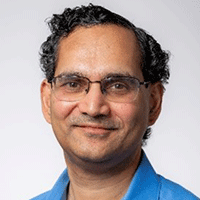
Sreekant Narumanchi
National Renewable Energy Laboratory
Presentation Title: Overview
Abstract: An overview will be presented covering power die/chips, magnetic materials for power electronics and electric motors, power modules, inverter/converter and electric motors, thermal management, reliability, and digital twin diagnostics and prognostics in the context of medium- and heavy-duty on-road vehicle applications.
Biography: Sreekant Narumanchi is a Distinguished Member of Research Staff and the Group Manager of the Advanced Power Electronics and Electric Machines (APEEM) group within the Energy Conversion and Storage Systems Center at the National Renewable Energy Laboratory, in Golden, CO, U.S.A. He is an ASME Fellow, and an IEEE Senior Member. He has published over 135 peer-reviewed journal- and conference papers and book chapters, and 6 patents in packaging, thermal management and reliability. Professionally, he is active as an Associate Editor, a conference organizer, on advisory boards, and in leading technical committees. He has received multiple recognitions from ASME and IEEE.
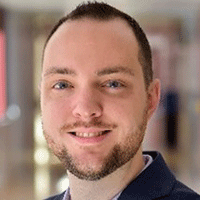
Andrew Binder
Sandia National Laboratories
Presentation Title: Power Semiconductor Devices for Electric Drivetrains
Abstract: Next-generation power semiconductor devices are a key enabler in achieving the DOE targets for electric drivetrains. Developing new semiconductor devices is a costly and time-intensive process. Towards this end, high-fidelity models can be leveraged to predict the performance advantages of next-generation semiconductors, and those models can be deployed at the system level to understand the key advantages and true impact of new materials and devices. This talk will highlight the power semiconductors thrust within the NEXT-DRIVE project and the key experimental and modelling framework that is being established to create next-generation baselines.
Biography: Andrew T. Binder is a Principal Member of Technical Staff at Sandia National Laboratories. His research is focused on the development of kilovolt-class power semiconductor devices. Andrew leads a multidisciplinary team developing vertical GaN JBS and MOSFET devices as well as SiC BiDFETs. Under his leadership this team has successfully demonstrated a new process for vertical GaN trench MOSFETs at Sandia, an accomplishment which was selected to be featured in the 2021 U.S. DRIVE Highlight by the DOE. In addition to microfabrication, his research background includes a focus on the physics and modelling of breakdown for wide-bandgap power devices.
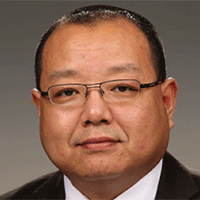
Jun Cui
Ames National Laboratory
Presentation Title: Magnetic Materials for EV Traction Motors and Power Electronics
Abstract: Magnetic materials are essential to EV motors and drive systems. Their development—spanning magnets, stator/rotor laminates, EMI filters, and inductors—focuses on boosting power density and efficiency while reducing the cost, and more recently, the supply risk. This talk reviews key challenges and recent progress. It covers both rare-earth and rare-earth-free permanent magnets; compares high-silicon, amorphous, and nanocrystalline electrical steels; and explores materials for filters and inductors, including soft ferrites, soft magnetic composites, and nitrides. The goal is to identify paths toward scalable, high-performance solutions for next-generation EV power electronics and motor systems.
Biography: Dr. Jun Cui specializes in ferroic materials for energy-efficient and renewable applications, including work on permanent magnets, high-silicon steel, high-entropy alloys, elastocaloric metals, and cryogenic magnetocalorics. He leads research in high-throughput materials synthesis and characterization. Before joining Iowa State University and Ames National Laboratory in 2015, he held positions at Pacific Northwest National Laboratory and GE Global Research. He earned his Ph.D. from the University of Minnesota and completed postdoctoral work at the University of Maryland. Dr. Cui holds 10 patents, 15 pending applications, and has authored over 100 peer-reviewed publications.
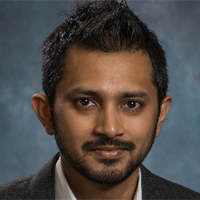
Shajjad Chowdhury
Oak Ridge National Laboratory
Presentation Title: Electric Drive Components for Medium and Heavy-Duty Vehicles
Abstract: This presentation will explore current and emerging technologies aimed at significantly enhancing the operational lifetime and performance of medium-duty and heavy-duty electric traction drive units. While innovations from light-duty vehicle applications offer a foundation, additional advancements are required to meet the demanding targets set by the DOE and the 21st Century Truck Partnership’s Electrification Technologies Sector team. The presenter will highlight proven technologies, potential adaptations, and novel approaches that promise improved efficiency, durability, and reliability. Emphasis will be placed on overcoming cost barriers and enabling mass market adoption through breakthroughs in materials, design, and system integration.
Biography: Shajjad Chowdhury received the M.Sc. degree in power and control engineering from Liverpool John Moores University, Liverpool, U.K., in 2011, and the Ph.D. degree in electrical and electronics engineering from the University of Nottingham, Nottingham, U.K., in 2016. In January 2017, he joined the Power Electronics, Machines and Control Group, University of Nottingham, as a Research Fellow. In 2018, he joined the Oak Ridge National Laboratory, Oak Ridge, TN, USA, where he is currently working as a Senior Research Staff with the Electric Drive Research Group. His research interests include multilevel converters, modulation schemes, and high-performance ac drives.
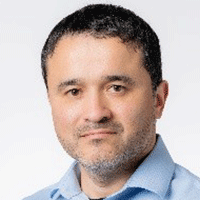
Gilbert Moreno
National Renewable Energy Laboratory
Title: Thermal Management and Thermo-Mechanical Reliability (Power Electronics and Electric Motor)
Abstract: The presentation will provide an overview of automotive power electronics and electric machines thermal management systems that are typical for light-duty vehicles. Unique thermal and environmental aspects related to medium and heavy-duty vehicle applications will then be discussed. Finally, advanced thermal management and packaging technologies that could be evaluated and used in this project will be described.
Biography: Gilbert Moreno is a senior research engineer at the National Renewable Energy Laboratory where he conducts research into the thermal management of power electronics. He has worked at NREL for over 15 years developing advanced cooling technologies for various DOE and strategic partnership projects. He is an ASME Fellow.